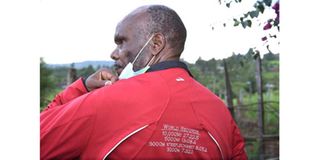Athletes should be taught their life is not just about sports

Legendary athlete Henry Rono shows the four World Records he broke when he was an active athlete, during an interview at his home in Kaptargon village, Nandi County on April 07, 2021.
What you need to know:
- For most, retirement comes unexpectedly, completely blindsiding an athlete and turning their world upside down
- For most athletes, sports success occurs at a time when they are just developing a sense of their personal identity
- Coaches, managers, agents, and everyone who works closely with athletes should enable them to grow not just in form and stature, but with a strong sense of personal identity and confidence
It is often said that a sports star will die twice, the first time at retirement. I followed the burial proceedings of track legend Henry Rono and heard his wife speak about the challenges he had with alcoholism and couldn’t help but wonder, what do athletes, especially elite athletes, usually do for a living after retirement?
In a way, retiring from sport can feel like the end. And it doesn’t always come because a sports person is ready for the next stage. Only the lucky ones like Kobe Bryant are able to choose their own time to leave. I still remember the late Kobe’s “Farewell Tour”, where he was celebrated by fans who turned out in large numbers to watch him play, soaking up every second of knowing it was his last season. Very few athletes get to experience that.
For most, retirement comes unexpectedly, completely blindsiding an athlete and turning their world upside down. It comes in so many forms – being cut off the team due to a coach’s decision, picking a career-ending injury, or being banned for violating certain rules. We scoff at retired athletes who struggle with joblessness, depression, or a lack of purpose, without realising that they were forced to confront not just the end of their careers. Retirement meant the end of a dream, the end of years of hard work and sweat, and the end of what had been a dominant part of their life.
For most athletes, sports success occurs at a time when they are just developing a sense of their personal identity. Throughout their youth, their time is filled with training, tournaments, and travel. This can result in a single mindedness that experts now call “identity foreclosure,” where they commit to an identity prematurely, without exploring other choices. As a result, an athlete ends up relying too much on their identity as a sportsperson. And when that is stripped away, what remains?
At an age when most people are just beginning to put their feet properly under the table as far as career is concerned, many elite athletes are already wrapping their working lives up, and facing crises of identity, loss of teammates and team spirit, and a horrifying lack of purpose.
Getting them medical insurance and good housing, as the government has promised to do following the recent deaths of Rono and Kelvin Kiptum, is good. But a more wholesome approach would be to sensitise athletes against living a linear life marked with strict schedules and a seemingly never-ending chase for glory. To smoothen their transition to regular adult life, these athletes need to be helped to develop into well-rounded people so that their identities do not rest entirely on their sporting prowess.
Coaches, managers, agents, and everyone who works closely with athletes should enable them to grow not just in form and stature, but with a strong sense of personal identity and confidence, perhaps by encouraging them, nay, allowing them to explore different sides of their personalities.
Saying goodbye to decades of a sporting career can be ugly, messy, and highly emotional, leaving one confused and depressed. And unfortunately, no one can prepare you for that. Fare thee well, Henry Rono.




